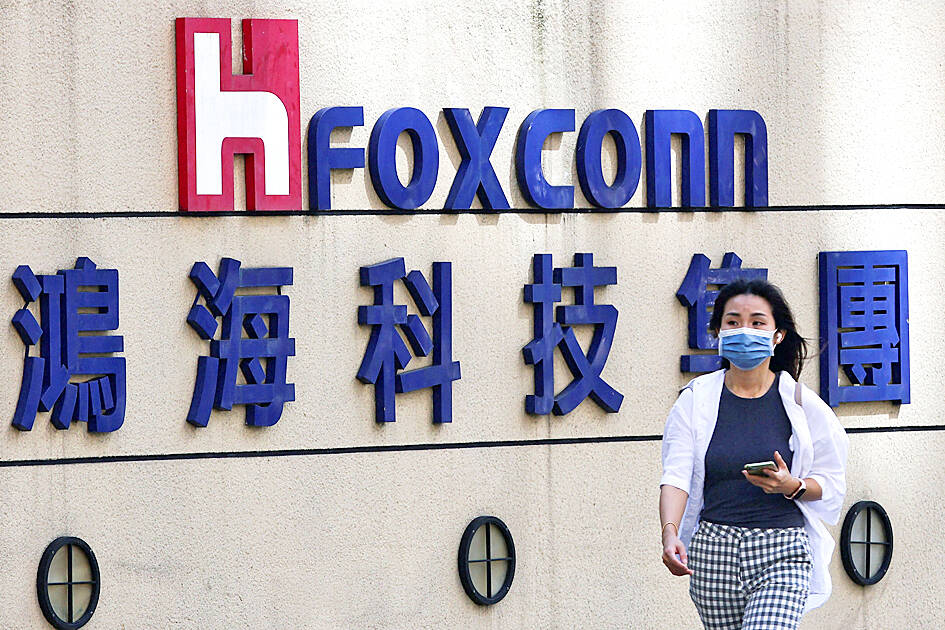Hon Hai Precision Industry Co (鴻海精密), also known as Foxconn Technology Group (富士康科技集團), is teaming up with STMicroelectronics NV for a bid to build a semiconductor factory in India, seeking state backing to broaden its footprint in the South Asian country.
Hon Hai and French-Italian STMicro are applying for state support from India for a 40-nanometer chip plant, people familiar with the matter said, asking not to be identified. Such mature chips are used in cars, cameras, printers and in a wide variety of other machines.
The move comes after Hon Hai’s attempted partnership with billionaire Anil Agarwal’s Vedanta Resources Ltd fell apart after a year of little progress. By partnering with STMicro, the Taiwanese electronics maker is working with a chip-industry pioneer to expand in the lucrative-but-difficult semiconductor business.

Photo:Reuters
However, neither Hon Hai or Vedanta have significant experience in chipmaking. Furthermore, their joint venture was thwarted by delays in finding a partner with production-ready chip technology and obtaining approvals for state subsidies.
New Delhi has asked Hon Hai, Apple Inc’s key assembly partner, for more details about its partnership with STMicro, the people said. Hon Hai is also in talks with other companies that have chip-making technology, one insider said.
Indian Prime Minister Narendra Modi has pledged US$10 billion to woo global chipmakers, promising his administration would cover half the cost of setting up semiconductor sites. That effort has prompted US memorychip firm Micron Technology Inc to announce a US$2.75 billion assembly and testing facility in Modi’s home state of Gujarat.
Other chip-related firms moving into India include Advanced Micro Devices Inc and equipment maker Applied Materials Inc, which plan to spend US$400 million each on R&D and engineering centers in the southern tech hub of Bengaluru.
The Indian Ministry of Electronics and Information Technology did not respond to a request for comment. Hon Hai and STMicro spokespersons declined to comment.

Intel Corp chief executive officer Lip-Bu Tan (陳立武) is expected to meet with Taiwanese suppliers next month in conjunction with the opening of the Computex Taipei trade show, supply chain sources said on Monday. The visit, the first for Tan to Taiwan since assuming his new post last month, would be aimed at enhancing Intel’s ties with suppliers in Taiwan as he attempts to help turn around the struggling US chipmaker, the sources said. Tan is to hold a banquet to celebrate Intel’s 40-year presence in Taiwan before Computex opens on May 20 and invite dozens of Taiwanese suppliers to exchange views

Application-specific integrated circuit designer Faraday Technology Corp (智原) yesterday said that although revenue this quarter would decline 30 percent from last quarter, it retained its full-year forecast of revenue growth of 100 percent. The company attributed the quarterly drop to a slowdown in customers’ production of chips using Faraday’s advanced packaging technology. The company is still confident about its revenue growth this year, given its strong “design-win” — or the projects it won to help customers design their chips, Faraday president Steve Wang (王國雍) told an online earnings conference. “The design-win this year is better than we expected. We believe we will win

Chizuko Kimura has become the first female sushi chef in the world to win a Michelin star, fulfilling a promise she made to her dying husband to continue his legacy. The 54-year-old Japanese chef regained the Michelin star her late husband, Shunei Kimura, won three years ago for their Sushi Shunei restaurant in Paris. For Shunei Kimura, the star was a dream come true. However, the joy was short-lived. He died from cancer just three months later in June 2022. He was 65. The following year, the restaurant in the heart of Montmartre lost its star rating. Chizuko Kimura insisted that the new star is still down

While China’s leaders use their economic and political might to fight US President Donald Trump’s trade war “to the end,” its army of social media soldiers are embarking on a more humorous campaign online. Trump’s tariff blitz has seen Washington and Beijing impose eye-watering duties on imports from the other, fanning a standoff between the economic superpowers that has sparked global recession fears and sent markets into a tailspin. Trump says his policy is a response to years of being “ripped off” by other countries and aims to bring manufacturing to the US, forcing companies to employ US workers. However, China’s online warriors